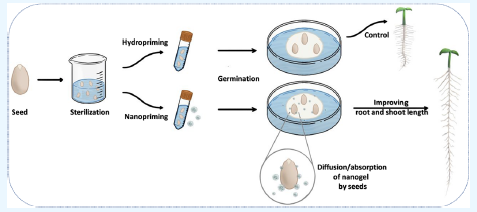645. Amine-Polyether-Epoxide Nanoplatform-Driven Seed Germination, Plant Growth, and Nutrient Uptake for Sustainable Agriculture
Bruno A. Fico, Heber E. Andrada, Felipe B. Alves, Enzo E. da Silva, Julia S. Reinaldi, Denise C. Tavares, Iara S. Squarisi, Laura G. Nuevo, Gabriel Sgarbiero Montanha, Hudson W. P. de Carvalho, Fabián Vaca Chávez, Eduardo F. Molina, ACSOmega, (2025), DOI: 10.1021/acsomega.4c11661
Polymeric systems can facilitate the diffusion of micronutrients through seeds, offering an innovative and sustainable way to improve plant health and increase food production. In the present work, a polymeric nanogel based on polyether-POEdiamine and bisepoxide was synthesized and in-depth characterized, encompassing its morphological characteristics (by Transmission Electron Microscopy, TEM), the size distribution, and surface charge of the particles (by dynamic light scattering, DLS and zeta potential, ζ). The formation of the polymeric network was assessed using Fourier-transform infrared spectroscopy (FTIR) and proton nuclear magnetic resonance (1H NMR), confirming the opening of the epoxide ring and the formation of amine and glycol groups. The effects of seed priming with the nanogel (well-defined spherical particles, with sizes around 120 nm, named POE-gel) on the early growth stage of cucumber plants (Cucumis sativus) exhibited a discernible ameliorative impact on root and shoot lengths, with average improvements of 33% and 90%, respectively, compared to the control group after 12 days. Extensive investigation using germination assays and micro X-ray fluorescence (μ-XRF) analysis indicated potential applications of the POEgel as a carrier for micronutrients (such as Fe3+). The seeds treated with the iron-loaded POE-gel presented a substantial positive effect on root length, exhibiting a 3-fold increase in size compared with the control-Fe treatment at the same concentration. The loaded POE-gel effectively penetrated through the seed compartments, providing an even distribution of iron ions and facilitating the uptake of nutrients (K, Mn, and Zn) by the seeds. Toxicological assays using zebrafish (Danio rerio), seeds, and leaves revealed notable safety of the iron-loaded and unloaded POE-gel for agricultural purposes. Employing water as the only solvent in the synthesis, as well as eliminating the use of a catalyst, makes this class of polymeric particles suitable for sustainable agricultural applications. The findings of this work contribute to the development of sustainable agriculture, presenting an innovative approach to enhancing plant development and nutrient uptake through the application of polymeric nanogels as a seed priming technology.
